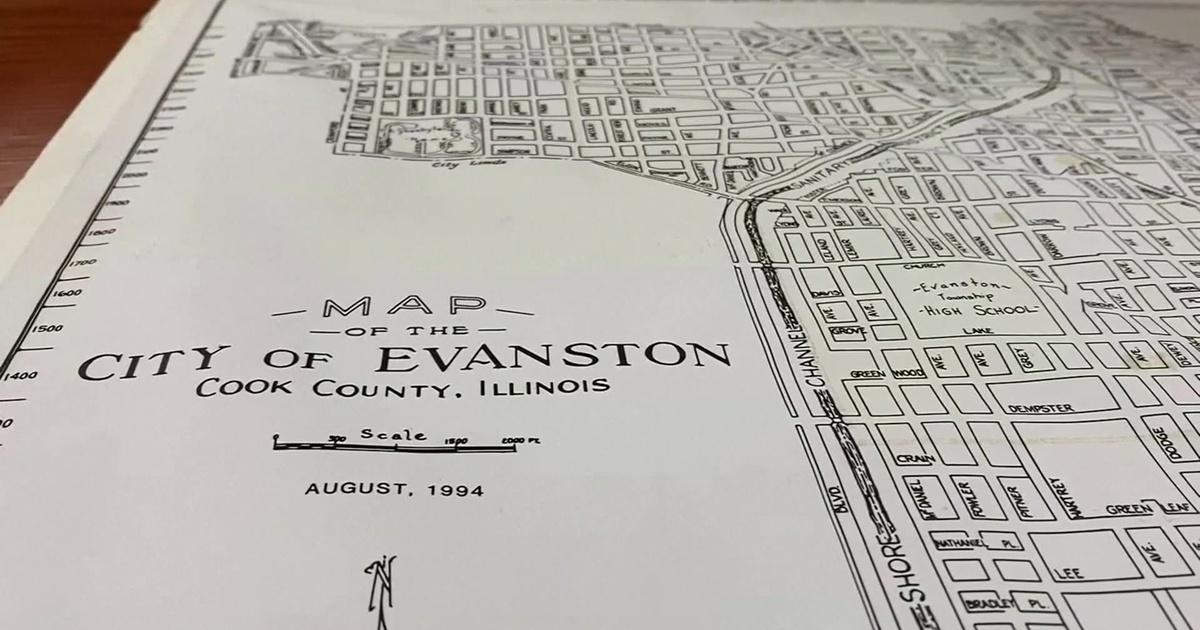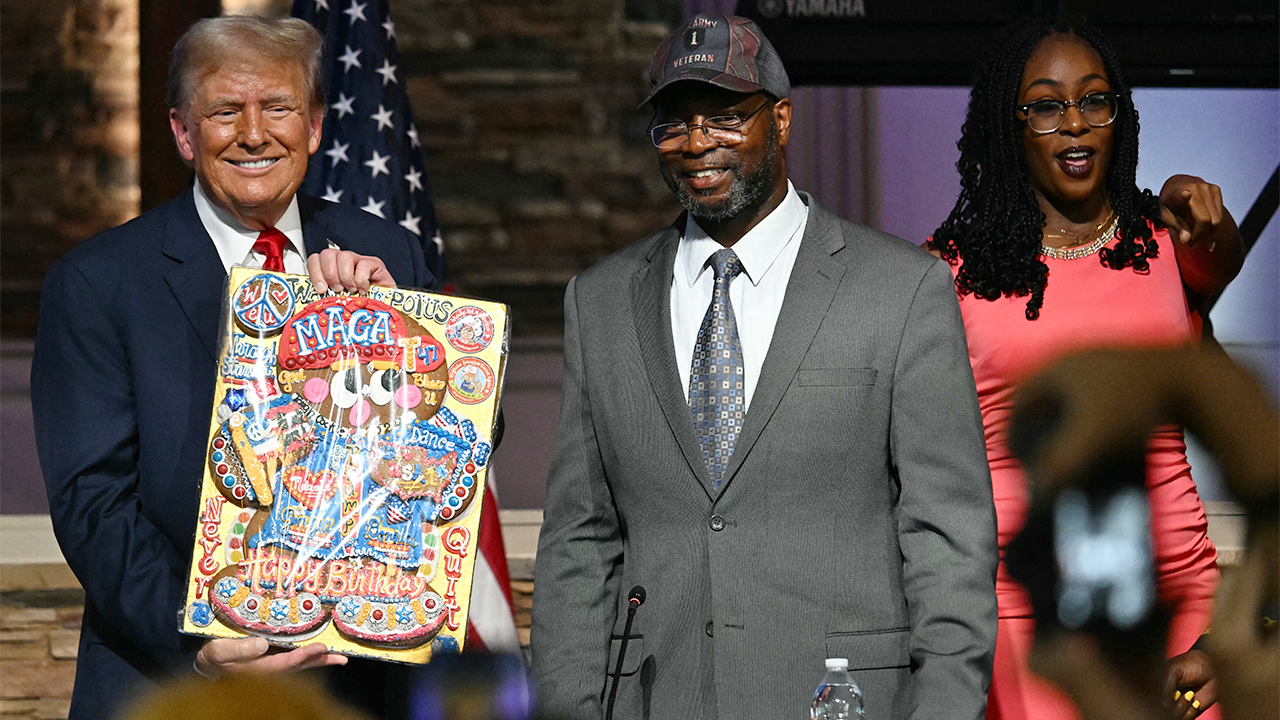Entertainment
'Sight' highlights the journey and faith of an Asian American medical hero who helped the blind see
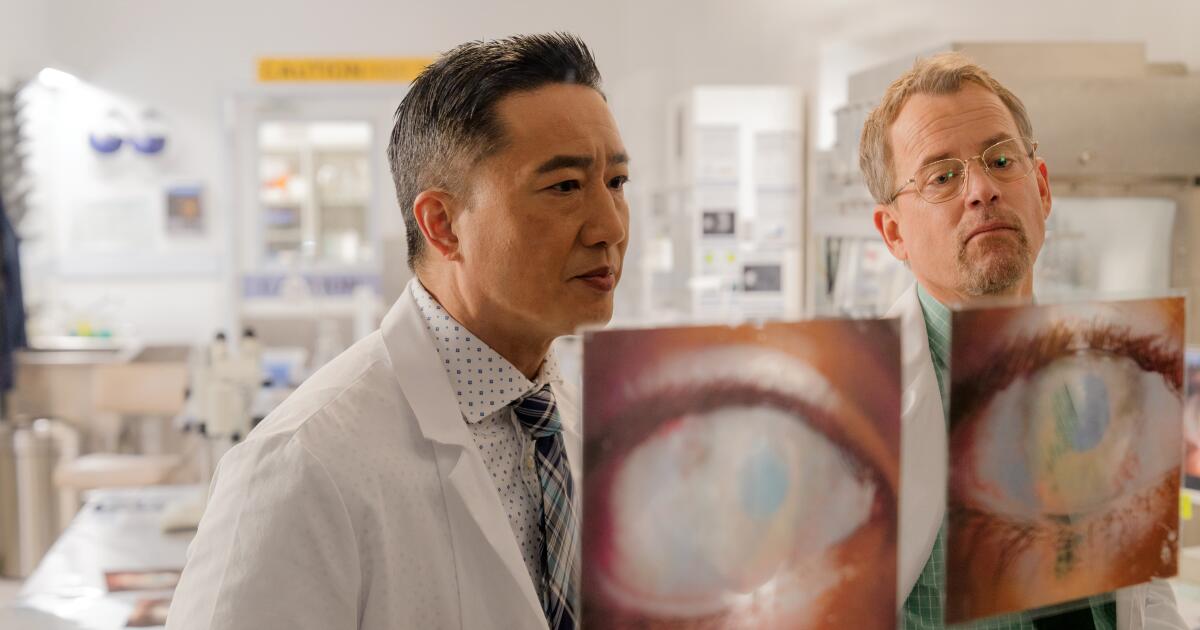
When Dr. Ming Wang came to the United States in 1982 at 21 years old, he had nothing but $50 and a Chinese-to-English translation book. He had just survived the violent cultural revolution in China — including the loss of a dear friend — during which the government had shut down most of the universities in the country.
We see this and much more in flashbacks throughout the movie “Sight,” which is based on Dr. Wang’s autobiography “From Darkness to Sight” and opens this weekend. In it, Dr. Wang (played by Terry Chen) ends up earning medical doctorates from Harvard and MIT (graduating magna cum laude from the latter), while also earning a PhD (laser physics, University of Maryland). He discovers a new way to potentially help blind people see — using an amniotic membrane contact lens if you want to get technical — as he and his medical partner Dr. Misha Bartnovsky (played by Greg Kinnear) embark on a mission to help orphans regain their sight.
The National Library of Medicine estimates that over the last 25 years, more than 20 million eyes were treated with laser eye surgery. Dr. Wang’s pioneering medical technique has restored the eyesight of millions around the world. As one of the leading experts in the field, Dr. Wang’s impact and philanthropy have been recognized in his home state of Tennessee, but his story may not be as widely known. As Asian American and Pacific Islander Heritage Month continues, Wang, who also executive-produced the film, wants to contribute to the storytelling tapestry of this country.
“My main motivation? Asian American stories are not told in American mainstream media too often. Authentic representation is a rare occurrence. I wanted to encourage Asian Americans, Chinese Americans and all immigrants to tell our story,” says Wang. “I will say, though, it’s a humbling experience.”
Ming Wang at 14 (Ben Wang) and Lili (Sara Ye) in “Sight.”
(Courtesy of Angel Studios)
Chen, a Canadian actor, was not only struck by Dr. Wang’s medical accomplishments, but also by the general and specific nature of his tale.
“It had nothing to do with kung fu or martial arts. It had nothing to do with being a gang member or any of the other tropes Hollywood has tripped over. And it also spoke to a larger swath of the immigrant story and the larger diaspora that exists outside of Asia,” says Chen.
Directed by Andrew Hyatt, and also starring Ben Wang, Fionnula Flanagan and Natasha Mumba, the film had the benefit of having Dr. Wang on the set. He was there to help consult on the technical jargon and operating room scenes, but many in the crew took advantage of his presence to ask for advice on medical issues. It was a welcome assurance on a 2020 set that was in the midst of working through a pandemic.
“Dr. Wang was a great resource to have,” says Kinnear. “This is the first movie that I did, that many of us did, after COVID. I kind of had a little bit of hesitation about the journey, but I felt like when I read Dr. Wang’s story, it put everything into perspective very quickly.”
The inspirational nature of the story may have even helped the mood on the set as well.
“When you finally go and you meet everybody and they slowly peel down their masks … I have to say that in the case of this film, [the substance of the story] did trickle down. There was an inspiring good feeling on the set,” says Kinnear.
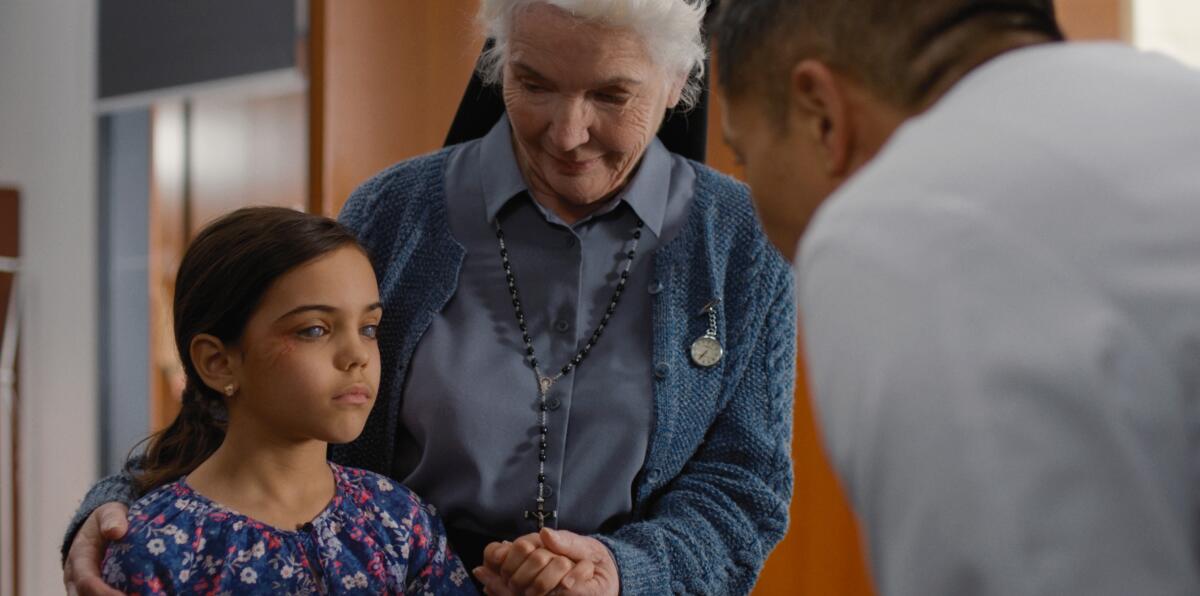
Kajal (Mia Swaminathan), Sister Marie (Fionnula Flanagan) and Dr. Wang (Terry Chen) in “Sight.”
(Courtesy of Angel Studios)
In the film, Dr. Wang tries to restore the sight of a young girl named Kajal (Mia Swaminathan) who is brought to his clinic by a nun ( Flanagan). It is one of the many touches in the film that put faith at the center of Dr. Wang’s struggles and his triumphs. This particular case is one that led to his revelation about using the placenta to create his curative lens, but it was also a case/client that tested his resolve.
“The reason that Kajal was chosen [to be the central case in the film] was because it was a very challenging case. Her injury was so severe that I had to dig deep to find a solution,” says Dr. Wang. “People say there’s no common ground between science and faith. Fortunately, I didn’t give up and as a Christian I kept praying.”
Angel Studios, known for its faith-based films, is distributing “Sight.” But its story of Dr. Wang’s past and his desire to help uplift blind orphans are themes that are just as prominent in the film.
“I think the message of the film is about freedom and faith,” says Dr. Wang. “‘Sight’ is a movie that reminds us how precious freedom is. How much we need to appreciate America. It may just take the story of an immigrant who did not have freedom to remind us how blessed we are.”

Movie Reviews
Short Film Review: Willow and Wu (2024) by Kathy Meng
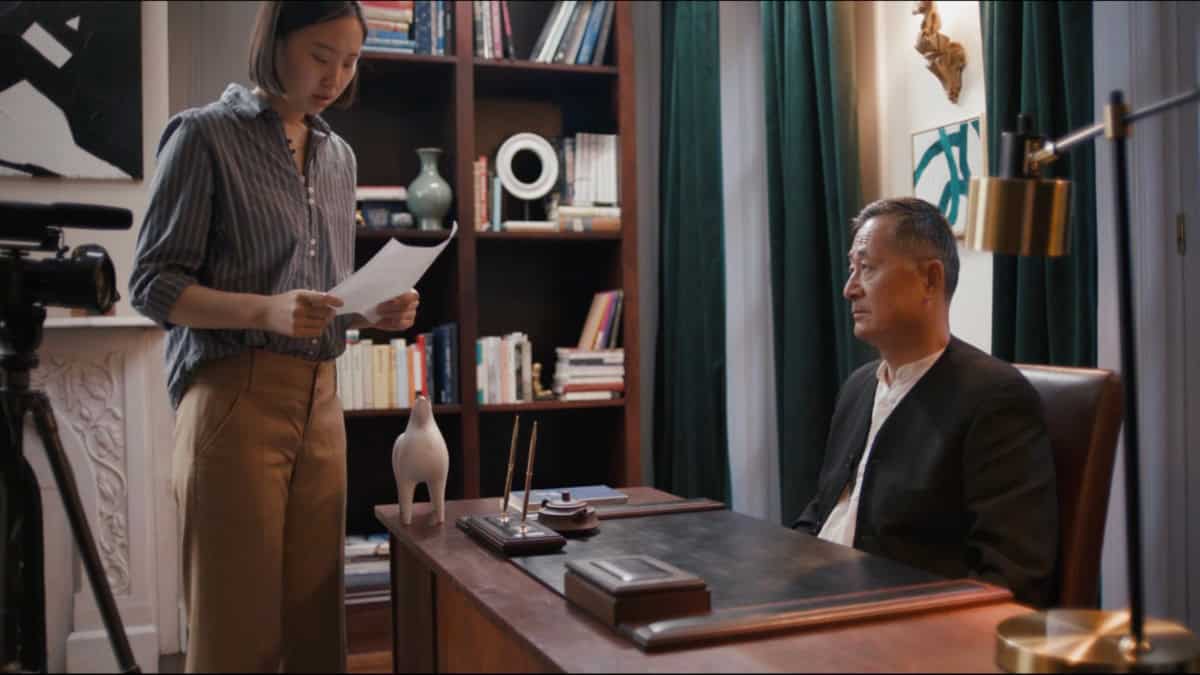
“Very few friends travel through a lifetime with you”
Fourth film by Kathy Meng, following “Elite Match”, “Willow and Wu” is a film shot in NYC, which has won the award for Best Screenplay at 27th Brooklyn Film Festival.
The film begins with a rather intense scene, where Waley seems to be breaking up with a girl through a video call. The girl’s cries following the call cements the fact, while the next scene has her, Willow, in an obviously depressed state receiving a call from Mrs Wu, her boss, insisting that she comes to her house right away. It turns out that although she is her assistant, Willow has to help her husband this time. Mr Wu wants to be filmed on a script his wife wrote and wants Willow to handle the recording. With her not having prior experience and being quite anxious, things do not go exactly smoothly.
Moreover, the video seems to focus on the passing of his friend Bao and soon asks her to read the script, before he decides to shoot the whole thing outside, even asking her to put some make up on him. It turns out that he is also anxious, which is why he appears so demanding. Eventually, loss brings the two closer.
If you like Willow and Wu, check also this review
Kathy Meng follows the film-about-film meta trope in her short, in order to present her comments. Loss, and how difficult it can be for people to express it is the main one, but there is more. That people who appear being difficult or even unlikeable can actually have reasons for being that way is also commented upon, as much as how opening up can help overcome psychological issues. That both protagonists benefit from this last aspect adds to the particular remark. Lastly, one could say that Meng also comments on how acting works, and how directors can cooperate with the actors in order for the latter to perform they way they expect them to.
Although there is a dramatic base here, Meng instead opts for a more happy-go-lucky approach, which works quite well in general, particularly during the finale in the park, which is surprisingly cheerful. Aolan Guo’s smile as Willow, who gives an overall excellent performance, will definitely stay on the mind of any viewer, as will Yves Yan’s actual performance in the end, as Wu. Overall the acting is on a high level here with the two protagonists’ chemistry also being of the highest level.
Sancheev Ravichandran captures both the interiors and the exteriors shots with realism, without any particular exaltation, with the close-ups working well. Remy LaFlamme’s editing results in a fast pace that allows the full story to be leisurely told in just 13 minutes.
“Willow and Wu” is a very appealing short that manages to tell a full story in rather economical and entertaining fashion. I think Meng is ready to transition to features, as I think she would be quite good in a family drama.
Entertainment
2024 Tony Awards winners list: 'Stereophonic,' 'The Outsiders,' Jeremy Strong, Daniel Radcliffe
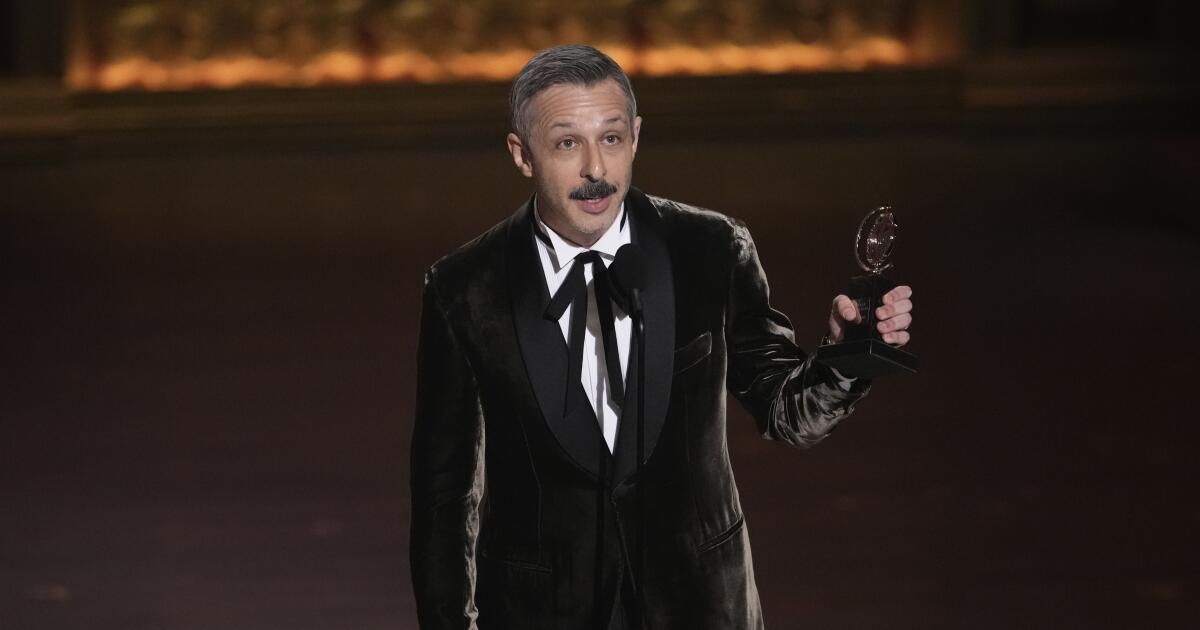
David Adjmi’s “Stereophonic” scored five Tony Awards including best play, and “The Outsiders” took home four trophies including an upset win for best musical as Broadway honored its finest on Sunday night.
Jonathan Groff won lead actor in a musical and co-star Daniel Radcliffe won featured actor for “Merrily We Roll Along,” which took home four awards total including best revival of a musical. Heading into the ceremony, the Alicia Keys musical “Hell’s Kitchen” and “Stereophonic” led with 13 nominations each, and a starry list of contenders included Eddie Redmayne for “Cabaret at the Kit Kat Club,” Jessica Lange and Jim Parsons for “Mother Play,” Rachel McAdams for “Mary Jane,” Leslie Odom Jr. for “Purlie Victorious,” and Sarah Paulson and Corey Stoll for “Appropriate.” The ceremony can now be streamed on demand; here’s how.
The complete winners list:
The company of “The Outsiders” performs during the 77th Tony Awards on Sunday.
(Charles Sykes / Invision / AP)
Best musical
“Hell’s Kitchen”
“Illinoise”
WINNER — “The Outsiders”
“Suffs”
“Water for Elephants”
Best play
“Jaja’s African Hair Braiding”
“Mary Jane”
“Mother Play”
“Prayer for the French Republic”
WINNER — “Stereophonic”
Best revival of a musical
“Cabaret at the Kit Kat Club”
“Gutenberg! The Musical!”
WINNER — “Merrily We Roll Along”
“The Who’s Tommy”
Best revival of a play
“An Enemy of the People”
WINNER — “Appropriate”
“Purlie Victorious: A Non-Confederate Romp Through the Cotton Patch”
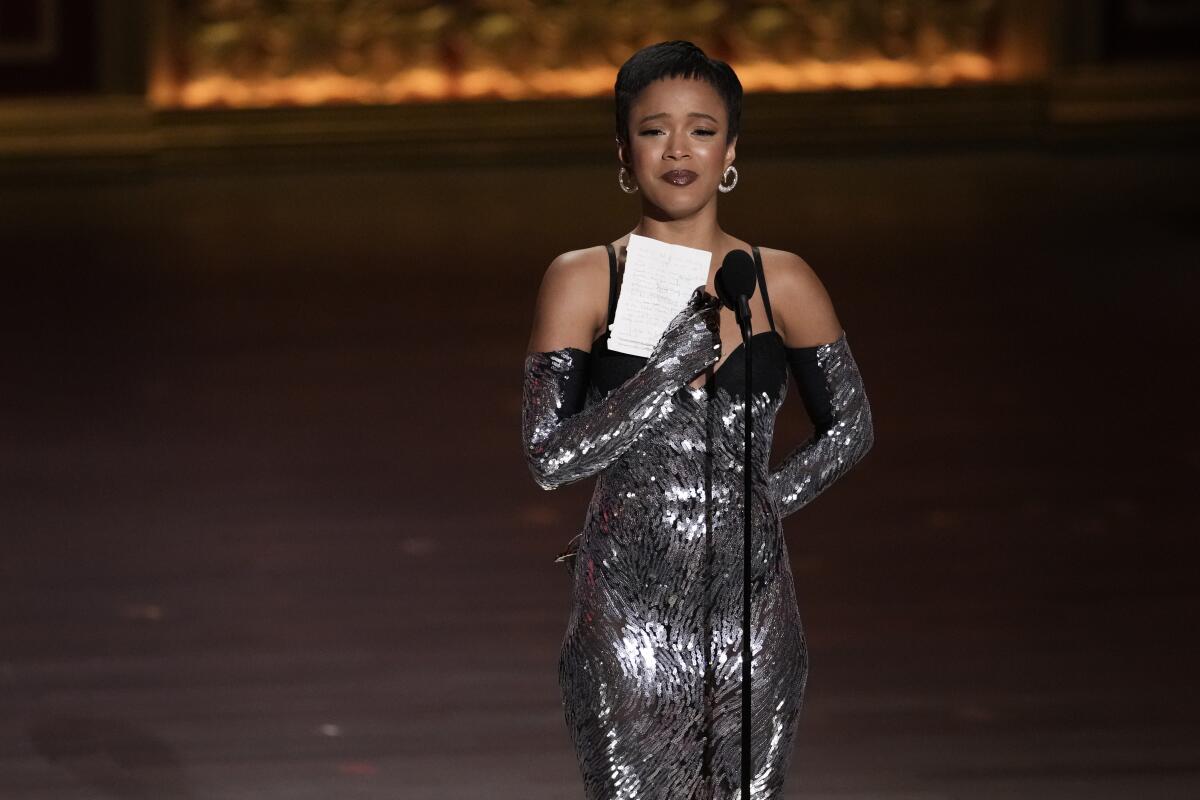
In the most moving speech of the night, Maleah Joi Moon accepts the Tony for lead actress in a musical for “Hell’s Kitchen.”
(Charles Sykes / Invision / AP)
Lead actress in a musical
Eden Espinosa, “Lempicka”
WINNER — Maleah Joi Moon, “Hell’s Kitchen”
Kelli O’Hara, “Days of Wine and Roses”
Maryann Plunkett, “The Notebook”
Gayle Rankin, “Cabaret at the Kit Kat Club”
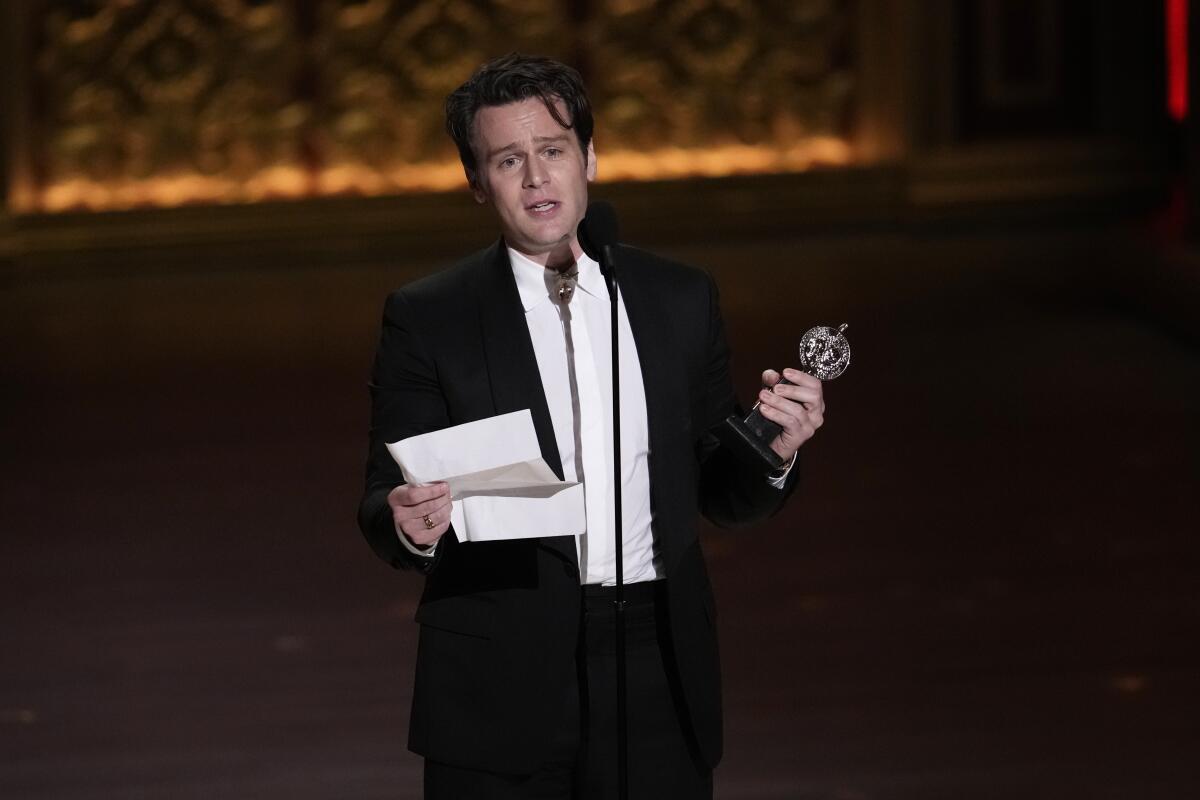
An emotional Jonathan Groff accepts the award for lead actor in a musical for “Merrily We Roll Along.”
(Charles Sykes / Invision / AP)
Lead actor in a musical
Brody Grant, “The Outsiders”
WINNER — Jonathan Groff, “Merrily We Roll Along”
Dorian Harewood, “The Notebook”
Brian D’Arcy James, “Days of Wine and Roses”
Eddie Redmayne, “Cabaret at the Kit Kat Club”
Lead actress in a play
Betsy Aidem, “Prayer for the French Republic”
Jessica Lange, “Mother Play”
Rachel McAdams, “Mary Jane”
WINNER — Sarah Paulson, “Appropriate”
Amy Ryan, “Doubt: A Parable”
Lead actor in a play
William Jackson Harper, “Uncle Vanya”
Leslie Odom Jr., “Purlie Victorious”
Liev Schreiber, “Doubt: A Parable”
WINNER — Jeremy Strong, “An Enemy of the People”
Michael Stuhlbarg, “Patriots”
Features actress in a play
Quincy Tyler Bernstine, “Doubt: A Parable”
Juliana Canfield, “Stereophonic”
Celia Keenan-Bolger, “Mother Play”
Sarah Pidgeon, “Stereophonic”
WINNER — Kara Young, “Purlie Victorious: A Non-Confederate Romp Through the Cotton Patch”
Featured actor in a play
WINNER — Will Brill, “Stereophonic”
Eli Gelb, “Stereophonic”
Jim Parsons, “Mother Play”
Tom Pecinka, “Stereophonic”
Corey Stoll, “Appropriate”
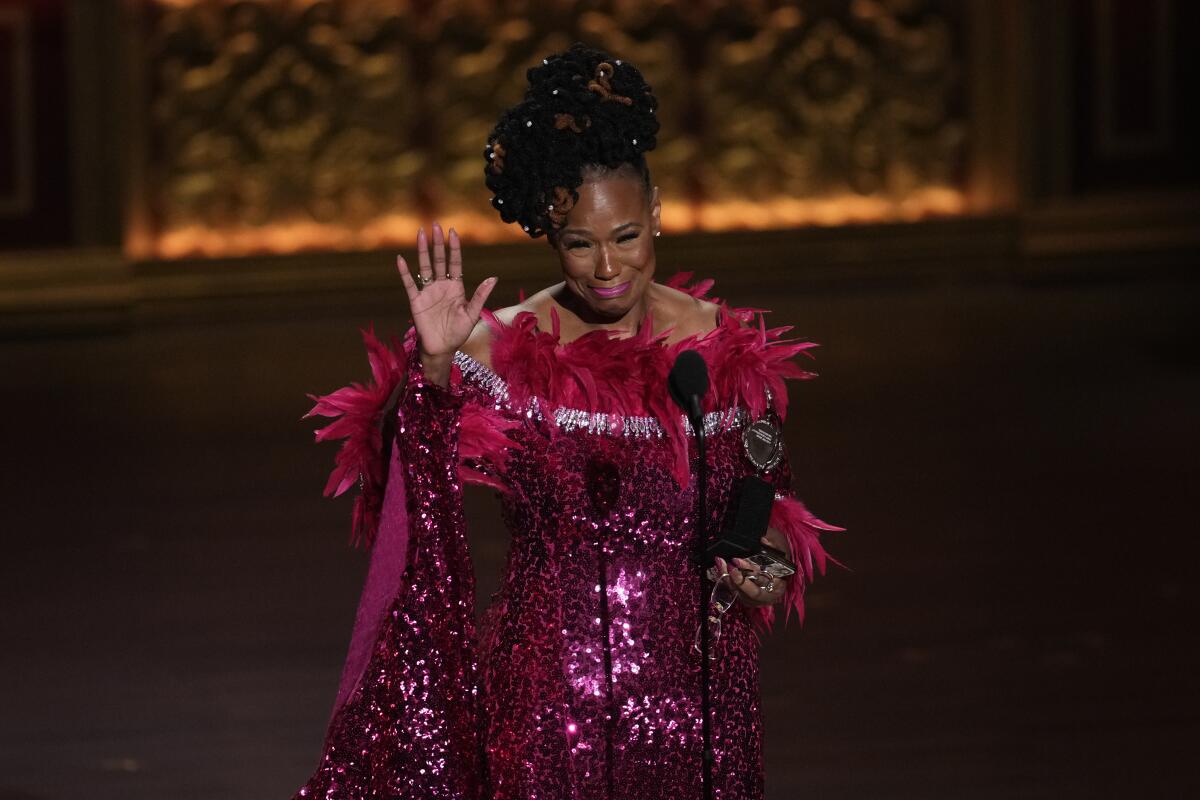
Theater veteran Kecia Lewis, winner for featured actress in a musical for “Hell’s Kitchen.”
(Charles Sykes / Invision / AP)
Featured actress in a musical
Shoshana Bean, “Hell’s Kitchen”
Amber Iman, “Lempicka”
Nikki M. James, “Suffs”
Leslie Rodriguez Kritzer, “Monty Python’s Spamalot”
WINNER — Kecia Lewis, “Hell’s Kitchen”
Lindsay Mendez, “Merrily We Roll Along”
Bebe Neuwirth, “Cabaret at the Kit Kat Club”
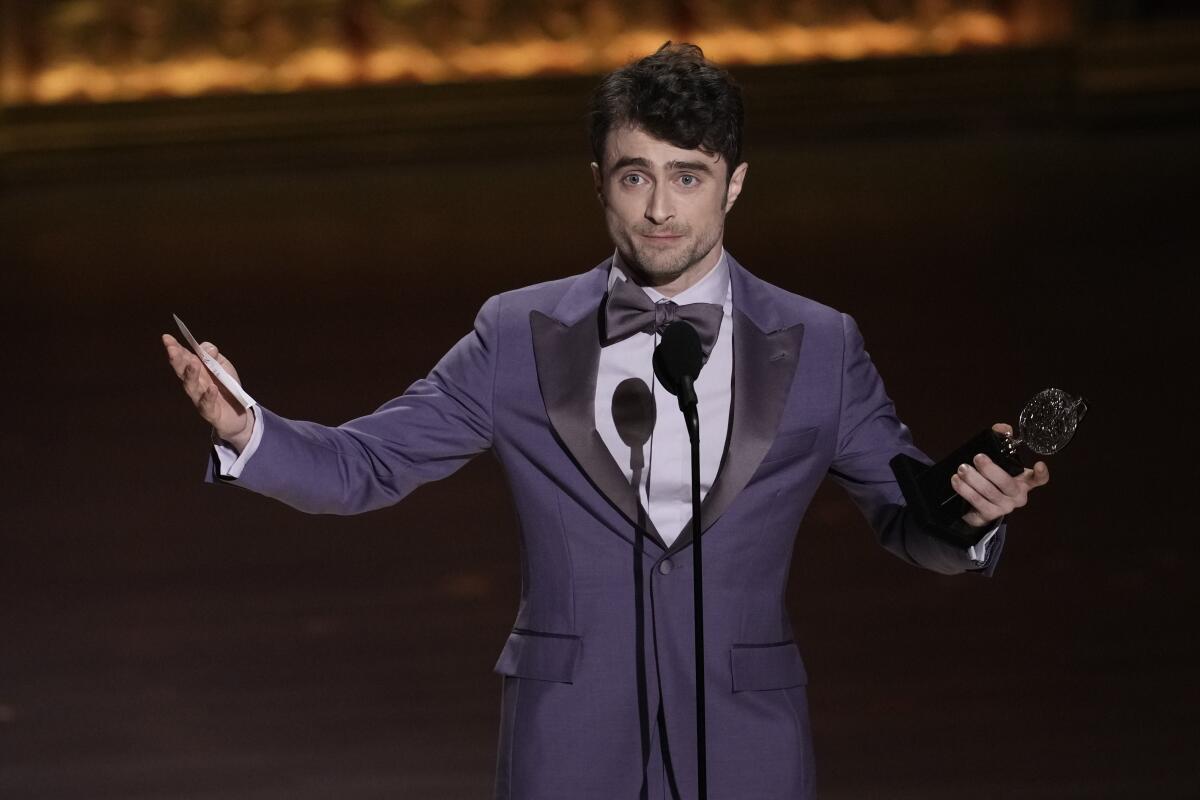
Daniel Radcliffe accepts the Tony Award for best actor in a featured role in a musical for “Merrily We Roll Along.”
(Charles Sykes / Invision / AP)
Featured actor in a musical
Roger Bart, “Back to the Future: The Musical”
Joshua Boone, “The Outsiders”
Brandon Victor Dixon, “Hell’s Kitchen”
Sky Lakota-Lynch, “The Outsiders”
WINNER — Daniel Radcliffe, “Merrily We Roll Along”
Steven Skybell, “Cabaret at the Kit Kat Club”
Direction of a play
WINNER — Daniel Aukin, “Stereophonic”
Anne Kauffman, “Mary Jane”
Kenny Leon, “Purlie Victorious: A Non-Confederate Romp Through the Cotton Patch”
Lila Neugebauer, “Appropriate”
Whitney White, “Jaja’s African Hair Braiding”
Direction of a musical
Maria Friedman, “Merrily We Roll Along”
Michael Greif, “Hell’s Kitchen”
Leigh Silverman, “Suffs”
Jessica Stone, “Water for Elephants”
WINNER — Danya Taymor, “The Outsiders”
Book of a musical
Kristoffer Diaz, “Hell’s Kitchen”
Bekah Brunstetter, “The Notebook”
Adam Rapp and Justin Levine, “The Outsiders”
WINNER — Shaina Taub, “Suffs”
Rick Elice, “Water for Elephants”
Orchestrations
Timo Andres, “Illinoise”
Will Butler and Justin Craig, “Stereophonic”
Justin Levine, Matt Hinkley and Jamestown Revival (Jonathan Clay and Zach Chance), “The Outsiders”
Tom Kitt and Adam Blackstone, “Hell’s Kitchen”
WINNER — Jonathan Tunick, “Merrily We Roll Along”
Choreography
Annie-B Parson, “Here Lies Love”
Camille A. Brown, “Hell’s Kitchen”
Rick Kuperman and Jeff Kuperman, “The Outsiders”
WINNER — Justin Peck, “Illinoise”
Jesse Robb and Shana Carroll, “Water for Elephants”
Scenic design of a play
dots, “Appropriate”
dots, “An Enemy of the People”
Derek McLane, “Purlie Victorious: A Non-Confederate Romp Through the Cotton Patch”
David Zinn, “Jaja’s African Hair Braiding”
WINNER — David Zinn, “Stereophonic”
Scenic design of a musical
AMP featuring Tatiana Kahvegian, “The Outsiders”
Robert Brill and Peter Nigrini, “Hell’s Kitchen”
Takeshi Kata, “Water for Elephants”
David Korins, “Here Lies Love”
Riccardo Hernández and Peter Nigrini, “Lempicka”
Tim Hatley and Finn Ross, “Back to the Future: The Musical”
WINNER — Tom Scutt, “Cabaret at the Kit Kat Club”
Costume design of a play
Dede Ayite, “Appropriate”
WINNER — Dede Ayite, “Jaja’s African Hair Braiding”
Enver Chakartash, “Stereophonic”
Emilio Sosa, “Purlie Victorious: A Non-Confederate Romp Through the Cotton Patch”
David Zinn, “An Enemy of the People”
Costume design of a musical
Dede Ayite, “Hell’s Kitchen”
WINNER — Linda Cho, “The Great Gatsby”
David Israel Reynoso, “Water for Elephants”
Tom Scutt, “Cabaret at the Kit Kat Club”
Paul Tazewell, “Suffs”
Lighting design of a play
Isabella Byrd, “An Enemy of the People”
Amith Chandrashaker, “Prayer for the French Republic”
Jiyoun Chang, “Stereophonic”
WINNER — Jane Cox, “Appropriate”
Natasha Katz, “Grey House”
Lighting design of a musical
Brandon Stirling Baker, “Illinoise”
Isabella Byrd, “Cabaret at the Kit Kat Club”
Natasha Katz, “Hell’s Kitchen”
Bradley King and David Bengali, “Water for Elephants”
WINNER — Brian MacDevitt and Hana S. Kim, “The Outsiders”
Sound design of a play
Justin Ellington and Stefania Bulbarella, “Jaja’s African Hair Braiding”
Leah Gelpe, “Mary Jane”
Tom Gibbons, “Grey House”
Bray Poor and Will Pickens, “Appropriate”
WINNER — Ryan Rumery, “Stereophonic”
Sound design of a musical
M.L. Dogg and Cody Spencer, “Here Lies Love”
Kai Harada, “Merrily We Roll Along”
Nick Lidster for Autograph, “Cabaret at the Kit Kat Club”
Gareth Owen, “Hell’s Kitchen”
WINNER — Cody Spencer, “The Outsiders”
Original score (music and/or lyrics) written for the theater
“Days of Wine and Roses”
Music & Lyrics: Adam Guettel
“Here Lies Love”
Music: David Byrne and Fatboy Slim
Lyrics: David Byrne
“The Outsiders”
Music & Lyrics: Jamestown Revival (Jonathan Clay and Zach Chance) and Justin Levine
“Stereophonic”
Music & Lyrics: Will Butler
WINNER
“Suffs”
Music & Lyrics: Shaina Taub
Movie Reviews
‘Hit Man’ Movie Review – Signals AZ

|
Text to speech audio articles made possible by the Quest Grant at Yavapai College. Tuition free industry recognized certificates for your career.
|
Hit Man is a fairly standard script. It doesn’t waste your time. It gets straight to the point. And it is a hell of a lot of fun.
Release Date: 05/24/2024Runtime: 115 minutesDirector: Richard LinklaterRotten Tomatoes: 97%iMBD: 7.1/10Where to Watch: Netflix |
  |
Mild-mannered professor of psychology and philosophy Gary Johnson (Glen Powell) lives at home with his plants, his birdfeeders, and his two cats Id and Ego
This sets up his character right away and tells the audience everything they need to know. He works part-time doing tech support for the local police, assisting on undercover ops to bust criminals trying to hire hitmen. But one day, the assigned agent is put on suspension at the last minute and Gary is chosen to take his place. Nervous, intellectual, science-obsessed Gary… their best option.
Whether he succeeds or fails will depend on if his anxiety gets the better of him. Walking into a diner to confront the criminal, everyone is on edge. But by the end, it’s clear that Gary is a natural.


The police department starts assigning him more jobs. As he gets into the act of convincing the targets that he is a lifelong criminal, he starts to take a liking to it—his psychology background and solo lifestyle affording him the flexibility to become anyone he needs to be to get them to let their guard down and make incriminating statements.
Then, one day, he meets a woman (Adria Arjona) attempting to escape from a dangerous husband
The lines between his real self and his undercover persona blur as he develops genuine feelings for her while also playing into her desires. This leads to a web of lies, confused identities, and criminal actions that stand apart from the usual tropes of the romantic comedy genre.
As expected, the truth does eventually come out, and in this one it does comes out in perhaps the most hilarious way possible. Discussing the specifics would spoil the story, but needless to say, the pressure builds over the course of the movie until an eventual release that circumvents the standards of the trope in a way that is absolutely delightful.
Despite its dark themes, this movie approaches its subject matter in a light-hearted way that will leave the most morally-upright audience member smiling by the end
Ultimately, it’s a story about identity, the flexible nature of reality, and who we are when personality can be constructed. “Seize the identity you want for yourself” is the quote the movie ends on, and it couldn’t have found a better, more absurd narrative to build that statement on.
About our Admit One Author


Isaac Frankel is a freelance writer and content creator specializing in reviews and analysis of cinema, interactive media, and mythological storytelling. He was raised in Prescott, AZ, wrote his first non-fiction book in 2013 after graduating from Tribeca Flashpoint College with a degree in Game & Interactive Media Design, and currently produces content for the YouTube channel: Off Screen.
More of his work and current projects can be found at www.isaacafrankel.com.
Read more stories from Dining, Entertainment, Recreation, & Travel on Signals A Z.com!
Subscribe and Be the First-2-Know!
-

 Politics1 week ago
Politics1 week agoNewson, Dem leaders try to negotiate Prop 47 reform off California ballots, as GOP wants to let voters decide
-

 World1 week ago
World1 week agoDozens killed near Sudan’s capital as UN warns of soaring displacement
-

 News1 week ago
News1 week agoWould President Biden’s asylum restrictions work? It’s a short-term fix, analysts say
-

 World1 week ago
World1 week ago‘Bloody policies’: Bodies of 11 refugees and migrants recovered off Libya
-

 Politics1 week ago
Politics1 week agoEmbattled Biden border order loaded with loopholes 'to drive a truck through': critics
-

 News1 week ago
News1 week agoRead Justice Clarence Thomas’s Financial Disclosures for 2023
-

 Politics1 week ago
Politics1 week agoGun group vows to 'defend' Trump's concealed carry license after conviction
-

 Politics7 days ago
Politics7 days agoShould Trump have confidence in his lawyers? Legal experts weigh in



